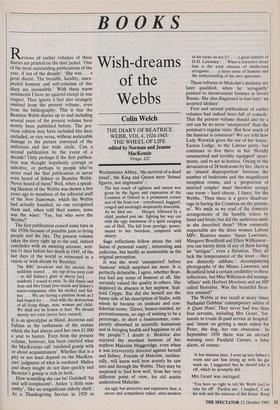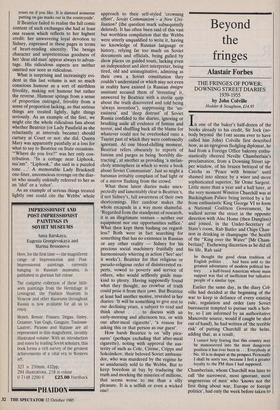BOOKS
Wish-dreams of the Webbs
Colin Welch
THE DIARY OF BEATRICE WEBB, VOL 4, 1924-1943: THE WHEEL OF LIFE edited by Norman and Jeanne MacKenzie Reviews of earlier volumes of these diaries are printed on the dust jacket. 'One of the most outstanding publications of the year, if not of the decade'. 'She was. . . a great diarist. The breadth, lucidity, unex- pected humour and self-criticism of this diary are irresistible.' With these warm sentiments I have no quarrel except in one respect. They ignore a fact also strangely omitted from the present volume, even from the bibliography. This is that the Beatrice Webb diaries up to and including several years of the present volume have mostly been published before. The pre- vious edition may have included bits here excluded, or vice versa, without noticeable damage to the picture conveyed of the authoress and her wide circle. Can a second publication be the event of a decade? Only perhaps if the first publica- tion was thought hopelessly corrupt or selective, or perhaps to people who've never read the first publication or 'never even heard of Sidney or Beatrice Webb.
Never heard of them? Well, when a speak- ing likeness of the Webbs was shown a few years ago to members of the editorial staff of the New Statesman, which the Webbs had actually founded, no one recognised them and, when told their names, none was the wiser: 'Yes, but who were the Webbs?'
The first publication ceased some time in the 1930s because of possible pain to living people and the like. The present volume takes the story right up to the end, indeed concludes with an amazing account, writ- ten 11 days before her death in 1943, of the last days of the world as witnessed in a vision or wish-dream by Beatrice:
The BBC broadcast and the electric fire suddenly ceased . . . my cup of tea went cold
— so did Sidney's glass of sherry [sic] . . .
suddenly I ceased to exist. So did Annie and Jean and Mrs Grant [two maids and Sidney's nurse-companion after his stroke] and Sid- ney . . . We are having a painless death as I had hoped for . . . God wills the destruction of all living things, man, woman and child. We shall not be frozen or hurt. We should merely not exist (never have existed).
It is an apocalypse as bland, decorous and Fabian as the euthanasia of the rentier which she had always used her own £1,000 a year to hasten. Even from the present volume, however, has been omitted what the MacKenzies call 'outdated gossip with or about acquaintances'. Whether that is a pity or not must depend on the MacKen- zies' judgment of what is outdated. Malice and sharp insight do not date quickly and Beatrice's gossip is rich in both. How wounding she can be! Gaitskell 'fat and self-complacent', Attlee 'a little non- entity', 'like an insignificant elderly clerk'. At a Thanksgiving Service in 1929 in Virago, f22 Westminster Abbey, 'the survival of a dead ritual', the King and Queen were 'formal figures, not impressive' :
The last touch of ugliness and unrest was given by the figure and expression of the Countess of Oxford in a prominent corner seat of the front row — overdressed, haggard, rouged and seemingly desperately miserable. As we filed out . . . Margot, followed by a child, pushed past me, fighting her way out with the ugly intentness of a spirit escaping out of Hell. The fall from prestige, power, meant to her boredom, tempered with misery.
Sage reflections follow about the 'old Satan of personal vanity', interesting and judicious, but hardly as memorable as the original perception.
It was the word 'unexpected' before 'humour' which surprised me most. It is perfectly debatable, I agree, whether Beat- rice had any sense of humour at all. She certainly valued the quality in others. She deplored its absence in her nephew, Staf- ford Cripps. But did she herself see the funny side of his description of Stalin, with whom he became on intimate and con- fidential terms: 'Direct, honest-minded, no pretentiousness, no sign of wishing to be a personage, in short a businessman, com- pletely absorbed in scientific humanism and in bringing health and happiness to all the people'? I doubt it. Beatrice also enjoyed the mordant humour of her nephew Malcolm Muggeridge, even when it was irreverently directed against herself and Sidney. Friends of Malcolm, inciden- tally, will know well how acutely he saw into and through the Webbs. They may be surprised to find how well, from her very different point of view, his old auntie understood Malcolm: An ugly but attractive and expressive face, a clever and sympathetic talker, ultra-modern In his views on sex (!) . . . a great admirer of D.H. Lawrence . . . What is attractive about him is the total absence of intellectual arrogance . . . a keen sense of humour and the understanding of his own ignorance.
These tributes to Malcolm's modesty are later qualified, when he 'arrogantly' . pointed to inconvenient famines in Soviet Russia. She also diagnosed in him later 'an inverted idoliser'.
First and second publications of earlier volumes had indeed been full of comedy. That the present volume should also be a riot can be no' more 'unexpected' than the postman's regular visits. But how much of the humour is conscious? We are told how Lady Warwick gives the use of her house, Easton Lodge, to the Labour party, but continues to live there in her 'floridly ornamented and lavishly equipped' apart- ments, and to act as hostess. Owing to the devastation of 28 bedrooms by fire, there is an 'absurd disproportion' between the number of bedrooms and the magnificent reception rooms, and a 'proportion of married couples' must therefore occupy one room — hard cheese, I fancy, for the Webbs. 'Then there is a grave disadvan- tage in having the Countess on the premis- es'. We smile as we read of the domestic arrangements of the humble toilers by hand and brain; but did the authoress smile as she described them? 'How eminently respectable are the three women Labour MPs', Beatrice muses: 'Susan Lawrence, Margaret Bondfield and Ellen Wilkinson you can barely think of any of them having an "intrigue", even a flirtation. They all lack the temperament of the lover — they are distinctly celibate.' Accompanying photographs of the Misses Lawrence and Bondfield lend a certain credibility to these reflections, but Miss Wilkinson did manage 'affairs' with Herbert Morrison and an MP called Horrabin. Was the beautiful Beat- rice amused?
The Webbs at war recall at many times Nathaniel Gubbins' contemporary satires of A Quiet Hotel. They never had less than four servants, including Mrs Grant, 'for- tunate to evade ill-paid service in hospital' and 'intent on getting a meat ration for Peter, the dog, her one obsession'. In September 1939 there was an air-raid warning over Passfield Corner, a false alarm, of course:
'A few minutes later, I went up into Sidney's room and saw him sitting up with his gas mask on. I suggested that he should take it off, which he promptly did.
Mrs Grant was outraged.
'You have no right to tell Mr Webb [sic] to take his off. 'Pardon me', I laughed, 'I am his wife and the mistress of this house. Keep
yours on if you like. It is damned nonsense putting on gas masks out in the countryside'.
If Beatrice failed to realise the full comic content of such exchanges she had at least one reason which reflects to her highest credit: her unwavering loyal devotion to Sidney, expressed in these pages in terms of heart-rending sincerity. The benign character and unpretentious goodness of her 'dear old man' appear always to advan- tage. His ridiculous aspects are neither omitted nor seen as ridiculous.
What is surprising and increasingly evi- dent in this last volume is not so much conscious humour as a sort of mirthless frivolity, making not humour but rather the reverse. Humour springs from a sense of proportion outraged, frivolity from a sense of proportion lacking, so that serious things are treated lightly, light things seriously. As an example of the first, we might cite the whole ridiculous fuss about whether Beatrice (or Lady Passfield as she reluctantly at intervals became) should curtsey at Court or not: she did. Queen Mary was apparently painfully at a loss for what to say to Beatrice on State occasions. "'Where do you live?" was her only con- tribution. "In a cottage near Liphook, ma'am". "Liphook," she said in a puzzled tone...' A memorable Lady Bracknell one-liner, unconscious revenge on the diar- ist who usually unkindly referred to her as an 'idol' or a `robot'.
As an example of serious things treated lightly one could cite the Webbs' whole approach to their self-styled 'crowning effort', Soviet Communism – a New Civi- lisation? (the question mark subsequently deleted). It has often been said of this vast but worthless compilation that the Webbs were utterly unqualified to write it, having no knowledge of Russian language or history, relying far too much on Soviet documents and officials, being gulled by show places on guided tours, lacking even an independent and alert interpreter, being tired, old and unimaginative, admiring as their own a Soviet constitution they couldn't understand or which may not even in reality have existed (a Russian emigre assistant accused them of `inventing' it, answered by Beatrice with a sterile quip about the truth discovered and told being `always invention'), suppressing the 'un- easiness' and `deep distrust' of Soviet Russia confided to the diaries, ignoring or brushing aside all evidence of famine and terror, and shuffling back all the blame for whatever could not be overlooked onto a Tsarist past of which they were confessedly ignorant. At one blood-chilling moment, Beatrice refers obscurely to reports of famine and purges as being 'horribly dis- tracting', at another as providing 'a melan- choly atmosphere in which to write a book about Soviet Communism'. Just so might a batsman irritably complain of bad light or of a mirror flashing from the crowd.
What these latest diaries make unex- pectedly and lamentably clear is Beatrice's, if not Sidney's, full awareness of their own shortcomings. Her candour makes the whole escapade in a way more shameful. `Regarded from the standpoint of research, it is an illegitimate venture – neither our equipment nor our opportunities suffice.' What then kept them bashing on regard- less? Both were in fact searching for something that has no existence in Russian or any other reality — Sidney for his precious social machinery fruitfully and harmoniously whirring in action (`See! see! it works'), Beatrice for that religious or pseudo-religious order of disinterested ex- perts, vowed to poverty and service of others, who would selflessly guide man- kind to plenty. Having supposedly found what they thought, no crowbar of truth could prise it from their jaws. But Beatrice at least had another motive, revealed in her diaries: 'It will be something to give zest to our declining years, a subject to read and think about . . . to discuss with an early-morning and afternoon tea, or with our after-meal cigarette', `a reason for asking this or that person as our guest'.
How harsh Beatrice is on `silly plea- sures' (perhaps excluding that after-meal cigarette), noting with approval the aus- terity of such as Cole, Citrine, Cripps and Sokolnikov, their beloved Soviet ambassa- dor, who was murdered by the regime he so assiduously sold to the Webbs. But to keep boredom at bay by traducing the truth and mocking the miseries of millions, that seems worse to me than a silly pleasure. It is a selfish or even a wicked one!























































 Previous page
Previous page